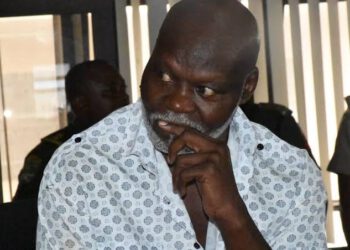The CEO of Alimity Obanisare Oil & Gas Nigeria Limited, Mr. Aleem Suleiman Olaitan, has been cleared by the court of fraud allegations.
Justice Abdulaziz Anka of a Lagos Federal High Court today acquitted and discharged oil marketer Aleem Suleiman Olaitan of a $100,000 USD fraud charge filed against him by the police.
In acquitting and discharging the oil marketer of the four-count amended charge filed by the Police Special Fraud Unit (PSFU), Justice Anka held that the prosecution failed to prove every ingredient of the allegations beyond a reasonable doubt.
Apart from acquitting and discharging the businessman of the allegations, the judge also ordered the Police Special Fraud Unit (PSFU), Ikoyi, Lagos, to release to him all his properties seized by the police.
The oil marketer, Aleem Suleiman Olaitan, was first arraigned before the court on March 8, 2016, on a two-count charge of alleged false pretense and fraudulently obtaining the sum of $100,000 USD from a foreign company, Topkings Partner (HK) Limited, under the pretense of supplying petroleum products.
He vehemently denied the allegations and pleaded not guilty to the charges.
Following his not-guilty plea, the prosecution opened its case and called a total of seven witnesses, as well as tendered some documents which were admitted as exhibits by the court.
Upon the conclusion of the prosecution’s case, the oil marketer opened his defense and maintained his innocence on all the charges.
At the resumed hearing of the matter in January this year, the prosecutor, Mr. Emmanuel Jackson, an Assistant Commissioner of Police (ACP), who is also Head of PSFU’s Legal and Prosecution Section, informed the court of the amended charge against the defendant.
This was, however, opposed by the lawyer for the oil marketer, Mr. Chimezie Victor Ihekweazu (SAN), who vehemently opposed the prosecution’s application for not obtaining the leave of the court.
Upon the objection raised by the defense team, the presiding judge, Justice Anka, ordered the parties to file their addresses on whether the prosecution can amend charges without the leave of the court.
Justice Anka, ruling on the submissions of the parties and after citing a series of legal authorities, dismissed the objection raised by the defense and held that the prosecution did not need the leave of the court to amend charges in a criminal case.
The judge consequently ordered that the amended charge be read to the defendant for him to take his plea.
In the amended charge, the oil marketer, who operates under the name and style of Alimity Obanisare Oil and Gas Nigeria Limited, was alleged to have induced the foreign company, Topkings Partner (HK) Limited, to enter into a contract with him. He falsely claimed to be a reliable businessman who could supply crude oil to them in China, by falsely telling them that he was in a joint venture with NNPC.
He was also alleged to have fraudulently obtained the sum of $100,000 USD, through his FCMB account, claiming that the money would be used to lift and ship the crude oil to the company in China.
He was further alleged to have forged several documents which include: a Letter of Authorization, a Certificate of Quality, a Certificate of Origin, a Letter of Acceptance, a Certificate of Compliance, and a Letter of Introduction, purporting them to have emanated from NNPC and NNPC Joint Venture Operators in Bonny Island, Rivers State, which he allegedly used to defraud his victim, Topkings Partner (HK) Nigeria Limited.
CSP Jackson told the court that the offenses contravened Section 1(1)(b) of the Advance Fee Fraud and Other Fraud Related Offences Act, 2006, and are punishable under Section 1(3) of the same Act, as well as Section 15(2)(b) of the Money Laundering (Prohibition) Act, 2011 as amended in 2012, but are punishable under Section 15(3) of the same Act.
The prosecutor also said the offenses contravened Section 465 of the Criminal Code, Cap C38, Laws of the Federation of Nigeria, 2004, but are punishable under Section 467 of the same Code, and Section 468 of the Criminal Code, Cap C38, Laws of the Federation of Nigeria, 2004, but are punishable under Section 467 of the same Code.
In defending against the above allegations, the oil marketer consistently stated that he was never an agent of the Nigerian National Petroleum Company (NNPC).
He also told the court that his inability to fulfill his part of the contract with the foreign company was largely caused by Topkings Partner (HK) Limited failing to fulfill its terms of the contract.
The oil marketer, through his lawyer, therefore urged the court to dismiss all the charges against him.
Delivering judgment on the matter today, Justice Anka, after analyzing both parties’ submissions, exhibits tendered, and citing a plethora of legal authorities, held that the prosecution failed to establish all the ingredients of the charges against the oil marketer.
In particular, the judge held that most of the witnesses called by the prosecution were not necessary for the matter.
Justice Anka also held that the prosecution failed to investigate the oil marketer’s claim regarding the agency he worked for.
Consequently, the judge held that the prosecution failed to establish the offenses of conspiracy, obtaining by false pretense, fraud, and forgery against the oil marketer.
After acquitting and discharging the oil marketer, the judge also ordered the PSFU to release all properties seized from him during the investigation and trial of the charge.
In acquitting and discharging the oil marketer, Justice Anka held: “It is hereby declared that the Defendant is not guilty of all the offenses charged and you are hereby discharged and acquitted.
“All the properties forfeited are hereby ordered to be returned to the Defendant.
“An order of this honorable court is hereby granted unfreezing the money in account No. 0031104453 with account name ALIMITY OBANISARE & GAS NIG. LTD operated by the Defendant in Sterling Bank Plc.
“The landed property situated at No. 2, Oke-Amu Avenue, off Governor’s Road, Ikotun, Lagos, covered by Deed of Assignment and other Title Deeds temporarily forfeited, is hereby ordered to be returned to the Defendant.”





















